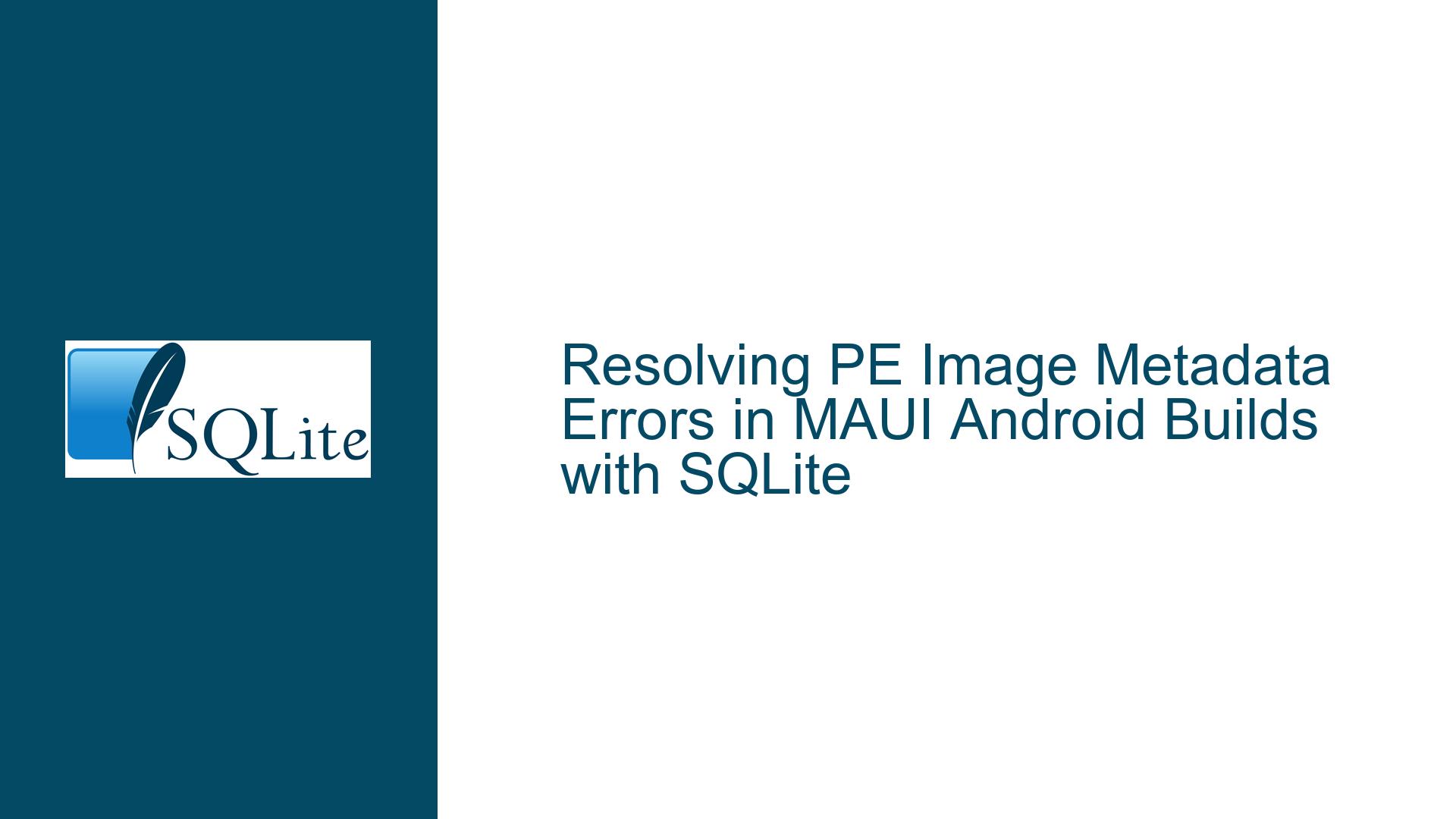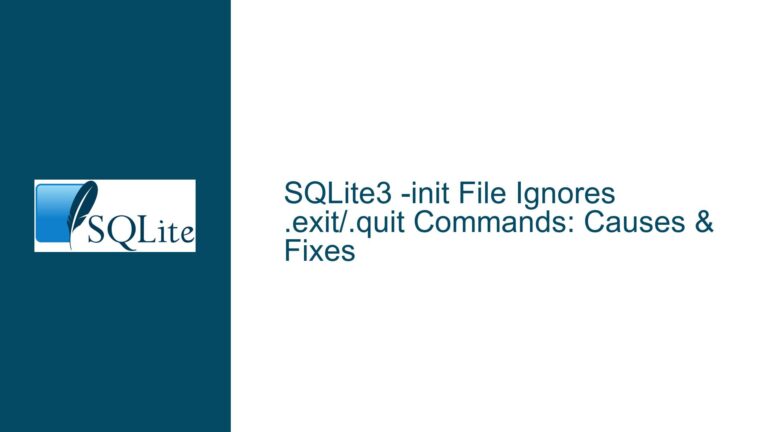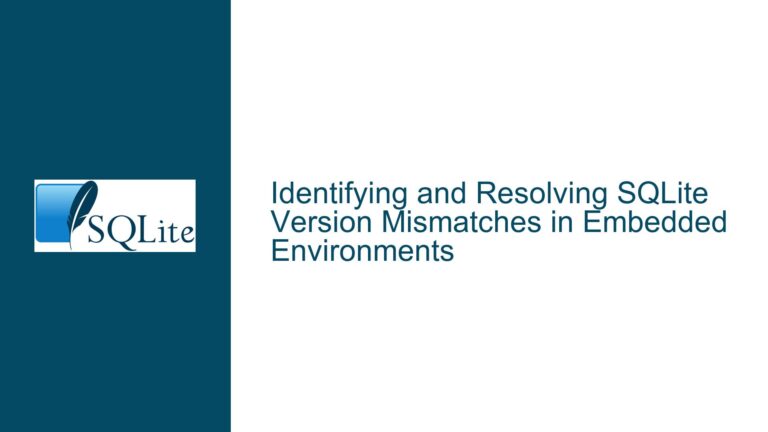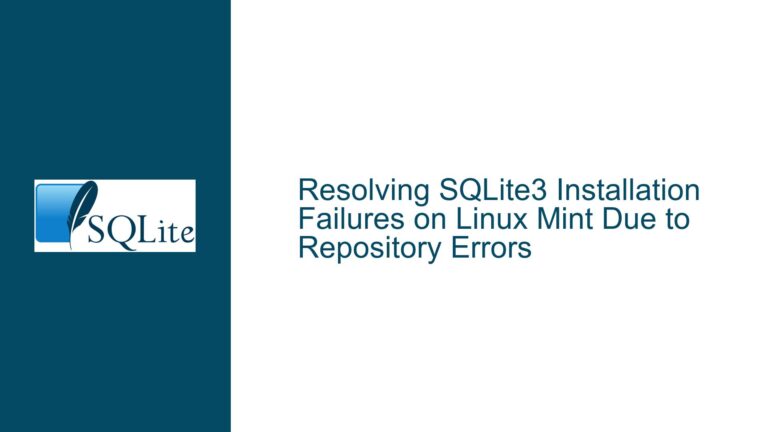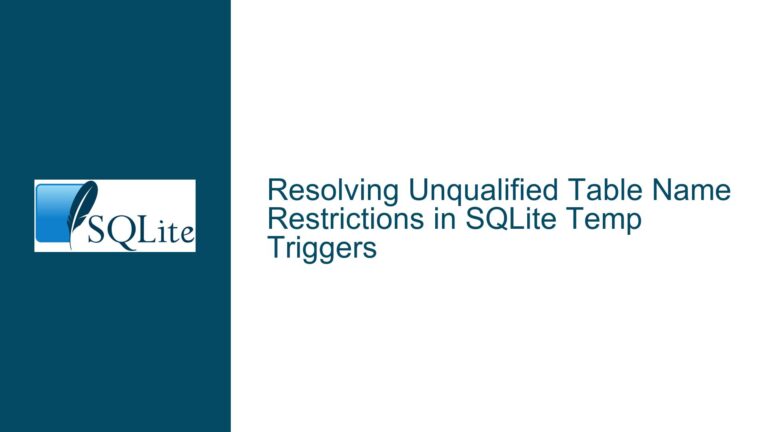Resolving PE Image Metadata Errors in MAUI Android Builds with SQLite
Understanding the PE Image Metadata Error in .NET Android Builds
The error XAPRAS7009 System.InvalidOperationException: PE image does not have metadata occurs during the build process of a .NET MAUI Android application (targeting net8.0-android) when the compiler attempts to process assemblies and encounters a Portable Executable (PE) file that lacks .NET metadata. This metadata is essential for the .NET runtime to understand the structure of assemblies, including types, methods, and references. The absence of metadata disrupts the assembly resolution and deduplication steps in the Xamarin.Android build pipeline, which is responsible for preparing managed code for Android deployment. While the error is not exclusive to SQLite integration, it often surfaces when incompatible or corrupted SQLite-related packages are introduced into the project, particularly System.Data.SQLite. The error stack trace points to failures in ProcessAssemblies.DeduplicateAssemblies, a task that validates and optimizes dependencies before packaging them into the Android application.
The PE format is a file structure for executables, object code, and DLLs used in Windows and cross-platform frameworks like .NET. In .NET, PE files contain metadata tables that describe the assembly’s structure. When the Xamarin.Android build tools (specifically Microsoft.Android.Sdk.AssemblyResolution.targets) attempt to read this metadata and fail, the build halts. The root cause often lies in one of the project’s dependencies—such as a native library masquerading as a managed assembly, a corrupted NuGet package, or a version mismatch between the SQLite library and the .NET Android target framework. For example, System.Data.SQLite relies on both managed code and native interop layers. If the native binaries are improperly bundled or the package conflicts with other dependencies, the build process may misinterpret them as managed assemblies, leading to the metadata error.
Identifying Causes of Invalid PE Metadata in SQLite-Integrated Builds
1. Mismatched or Incompatible SQLite Package Versions
The System.Data.SQLite NuGet package includes platform-specific native binaries for SQLite. If the package version is not compatible with the .NET 8 Android target (e.g., using a package built for .NET Framework 4.x instead of .NET Standard 2.0/2.1), the build process may attempt to process native DLLs as managed assemblies. Native DLLs lack .NET metadata, triggering the PE image error. Additionally, projects targeting net8.0-android require dependencies built for .NET 8 compatibility. Older SQLite packages not updated for .NET 8 may reference outdated dependencies that conflict with the Android SDK’s assembly resolution logic.
2. Corrupted or Partially Restored NuGet Packages
A partially downloaded or corrupted System.Data.SQLite NuGet package can result in incomplete or malformed DLLs. The NuGet cache (%userprofile%\.nuget\packages on Windows or ~/.nuget/packages on macOS/Linux) might contain invalid artifacts, causing the build process to reference broken binaries. This corruption prevents the PE metadata reader from parsing the assembly, as critical sections of the file are missing or altered.
3. Conflicting Architecture-Specific Binaries
The System.Data.SQLite package includes native libraries for multiple architectures (e.g., x86, x64, ARM). If the build process selects an incompatible architecture for the target Android device or emulator, the native library may be treated as a managed assembly. For instance, an ARM64-native library referenced in an x86-targeted build could bypass architecture-specific filters, leading the compiler to attempt metadata extraction from a non-managed binary.
4. Improper Assembly Trimming or Linking
.NET Android applications enable assembly trimming to reduce app size by removing unused code. Aggressive trimming settings might erroneously strip metadata from the SQLite assembly or its dependencies, rendering the PE image invalid. This is especially common when using the ILLink tool with custom configurations that exclude metadata essential for reflection or runtime operations.
5. Third-Party Package Conflicts
Dependencies that indirectly reference older or incompatible versions of SQLite (e.g., ORM libraries like Entity Framework Core with SQLite providers) can introduce version conflicts. These conflicts may force the build system to reference multiple SQLite binaries, some of which are not intended for Android use. The deduplication logic in ProcessAssemblies may fail to reconcile these conflicts, resulting in metadata errors.
Resolving PE Metadata Errors in SQLite-Backed Android Builds
Step 1: Validate SQLite Package Compatibility
Ensure the System.Data.SQLite package explicitly supports .NET 8 Android targets. Check the package’s dependencies in the NuGet repository (nuget.org) for compatibility with .NETStandard2.0, .NETStandard2.1, or .NET8.0. If the package is outdated, switch to a supported alternative like Microsoft.Data.Sqlite, which is maintained by the .NET team and optimized for cross-platform use. To replace the package:
- Uninstall
System.Data.SQLitevia the NuGet Package Manager. - Install
Microsoft.Data.Sqlite(version 8.0.0 or higher). - Update code to use
Microsoft.Data.SqliteAPIs, which are compatible with .NET 8 and MAUI.
Step 2: Clean and Rebuild the NuGet Cache
Corrupted packages in the NuGet cache can be cleared and regenerated using the following commands:
# Windows
dotnet nuget locals all --clear
# macOS/Linux
dotnet nuget locals all --clear
After clearing the cache, rebuild the project to force NuGet to redownload all dependencies. Verify that the System.Data.SQLite package (if retained) is restored without errors in the build output.
Step 3: Inspect and Exclude Native Binaries
If retaining System.Data.SQLite, ensure native libraries are excluded from managed assembly processing. Edit the project file (.csproj) to mark native binaries as resources rather than assemblies:
<ItemGroup>
<PackageReference Include="System.Data.SQLite" Version="1.0.117" />
</ItemGroup>
<ItemGroup>
<!-- Exclude native libraries from assembly resolution -->
<None Include="$(NuGetPackageRoot)\system.data.sqlite\**\*.dll" Exclude="$(NuGetPackageRoot)\system.data.sqlite\**\e_sqlite3.dll;$(NuGetPackageRoot)\system.data.sqlite\**\SQLite.Interop.dll" />
<AndroidNativeLibrary Include="$(NuGetPackageRoot)\system.data.sqlite\**\e_sqlite3.dll" />
<AndroidNativeLibrary Include="$(NuGetPackageRoot)\system.data.sqlite\**\SQLite.Interop.dll" />
</ItemGroup>
This configuration directs the build system to treat native SQLite binaries as runtime libraries rather than managed assemblies, preventing metadata extraction attempts.
Step 4: Diagnose Assembly Conflicts with Build Logging
Enable detailed MSBuild logging to identify the exact assembly causing the metadata error:
dotnet build -v:diag > build.log
Search the build.log file for entries related to PEReader.GetMetadataBlock or ProcessAssemblies. The log will specify the problematic DLL, such as SQLite.Interop.dll or a conflicting third-party library. Once identified, exclude or update the offending package.
Step 5: Configure Assembly Trimming Safeguards
Modify the project file to disable trimming for SQLite assemblies or enable metadata preservation:
<PropertyGroup>
<TrimMode>partial</TrimMode>
<AndroidLinkMode>None</AndroidLinkMode>
</PropertyGroup>
<!-- Alternatively, preserve specific assemblies -->
<ItemGroup>
<TrimmerRootAssembly Include="System.Data.SQLite" />
</ItemGroup>
This prevents the linker from removing metadata critical for SQLite operations.
Step 6: Align Target Architectures
Ensure the project’s target Android architectures (e.g., arm64-v8a, x86_64) match the native binaries included in System.Data.SQLite. Edit the .csproj to specify compatible architectures:
<PropertyGroup>
<RuntimeIdentifiers>android-arm64;android-x86</RuntimeIdentifiers>
</PropertyGroup>
Remove unsupported architectures from the build configuration to avoid referencing incompatible native binaries.
Step 7: Update the Android SDK and Build Tools
Outdated Xamarin.Android or .NET Android SDK components may mishandle assembly resolution. Update to the latest versions via Visual Studio’s installer or the dotnet CLI:
dotnet workload update android
After updating, rebuild the project to leverage fixes in the latest toolchain.
By systematically addressing package compatibility, build configuration, and dependency conflicts, developers can resolve PE metadata errors and ensure successful SQLite integration in .NET MAUI Android applications.
